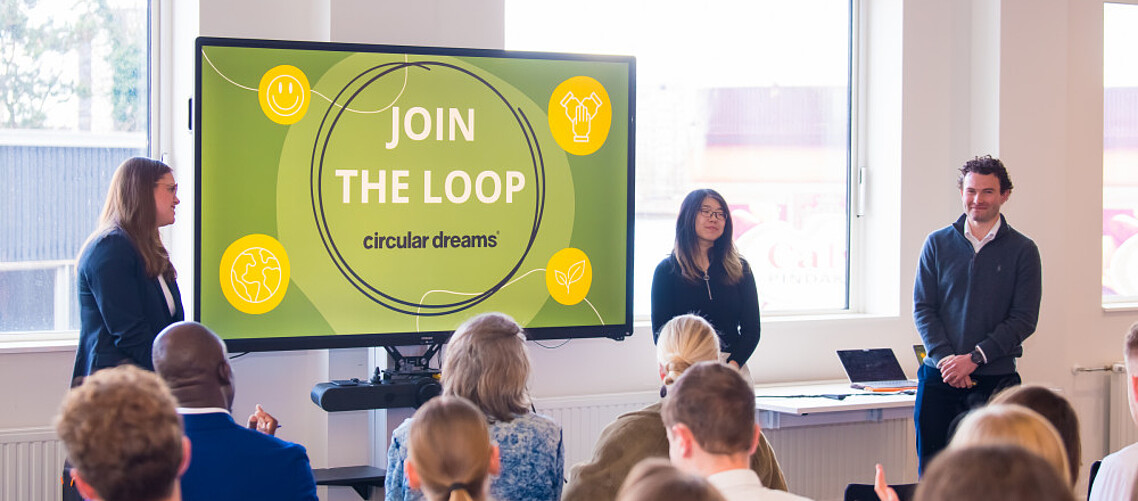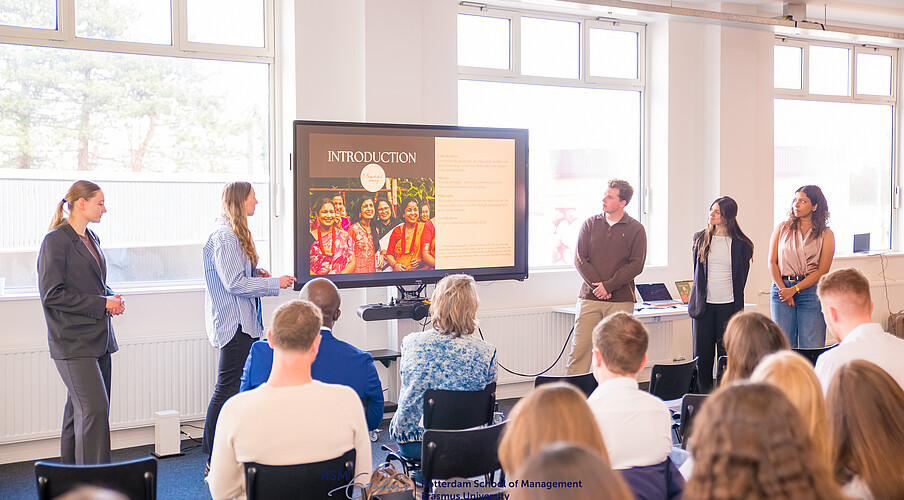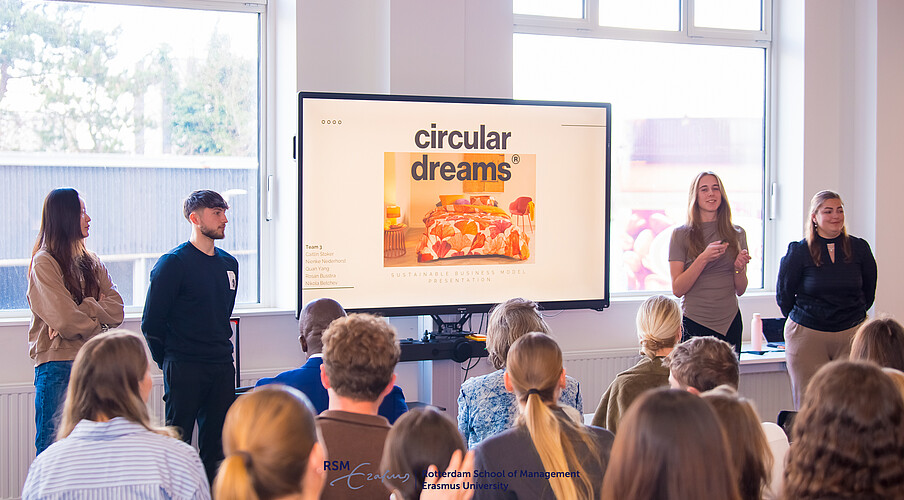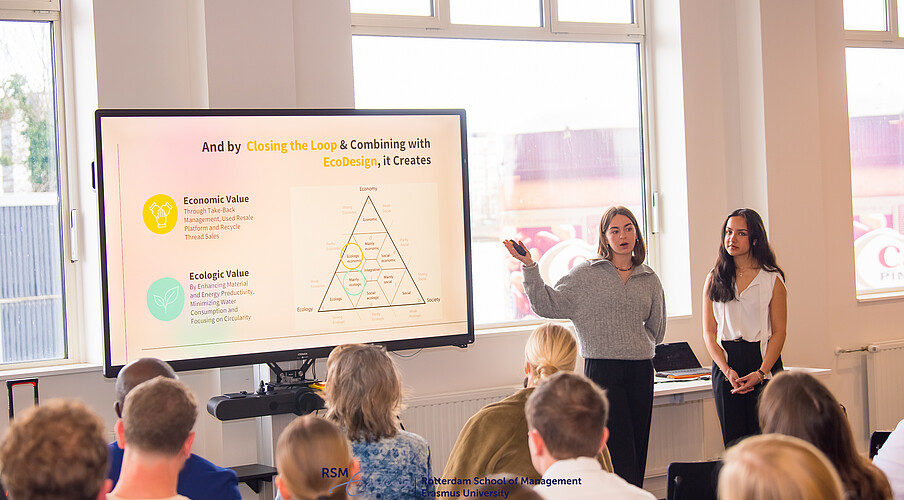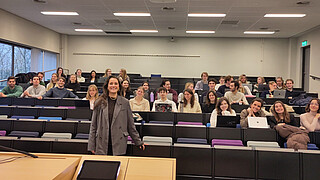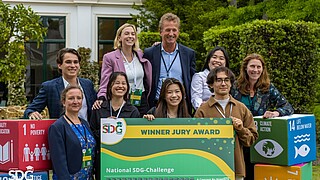After six weeks of work, the final presentations in March saw students bring their innovative thinking to making the companies more sustainable, impactful and profitable using business model frameworks learned in their studies. Some of their ideas were already being explored by the companies less than a week after the students’ presentation, and the companies appreciated finding out how their sustainable business models are perceived by younger consumers.
Course leader is RSM’s Dr Taslim Alade, who explained: “The goal is for students to develop competencies that employers are looking for, and to practice their leadership skills as they create impact-driven sustainable business models for organisations. This gives students a strong competitive edge in the job market because they are equipped to deliver value to organisations as employees, or as sustainable business model consultants with a reflexive and creative attitude to handling sustainability dilemmas.”
Companies taking part were: A Beautiful Story, fairtrade jewellery designed in the Netherlands and handmade in Nepal; Circular Dreams, a start-up for refurbished bedlinens operated by Beddinghouse; Primal Soles, cork shoe insoles and hotel slippers from a circular manufacturing process and Chainable, supplying kitchens within a circular supply chain.
The companies sent over their briefs in February at the start of the students’ course, and their representatives came onto campus to explain their business models and to host a Q&A session with the students. Six weeks later, the students were ready to present their ideas back to the companies at the Erasmus Hub! in the centre of Rotterdam.
Feasible in theory but…
The students commented that during the project they realised how challenging it is; initial proposals seemed feasible in theory but proved much harder to implement in practice, and they realised the complexity of integrating sustainability as a core concept in a business model while ensuring financial viability and operational efficiency.
Glimpse into real-world consultancy
“We were pushed to communicate our ideas clearly and engage in meaningful discussions. It also provided a glimpse into real-world consultancy, reinforcing the importance of aligning business strategy with sustainability goals in a way that is both innovative and financially viable,” said student Alessandro Cervi Gambaro.
The paradox of scaling up
Many of these students have considered becoming entrepreneurs precisely so they can make a real impact on the world with a profitable business. “We saw first-hand how difficult it is for businesses to balance sustainability, profitability, and growth,” said student Elena Mio. “The more a company expands, the greater its potential environmental impact, creating a paradox where in which scaling up can conflict with sustainability goals. Finding the right long-term strategy is not always easy. This project was both challenging and rewarding, pushing us to think critically about scalability, partnerships, and execution in a real-world context.”
New voices
Eva de Bruine, Impact Manager at A Beautiful Story and her colleague Head of Operations Ine Palm said they welcomed the opportunity to hear fresh ideas from people outside of their circle. Most of the ideas have been discussed internally before, and some are already in progress.
Boudewijn Mol leads initiatives for Circular Dreams, a start-up within Beddinghouse. “It was fascinating to witness how the student teams approached our business case from various angles – from consumer engagement strategies to operational scalability. While the proposals did not radically alter our existing strategic direction, several students demonstrated a remarkable level of inspiration and critical thought. Their energy and fresh perspectives reminded us of the importance of continuously inviting new voices into our mission,” said Boudewijn.
Chief Operating Officer at Primal Soles Jeremy Even said his experience working with the teams of master’s students was inspiring. “Since sustainability is at the core of Primal Soles' mission, it was rewarding to see how strongly the students connected with our vision. What I particularly enjoyed was their ability to bring fresh, innovative ideas to the table. They aren’t afraid to challenge the status quo and share their perspectives. As Primal Soles itself started as a student-led initiative, it was energising to exchange ideas with the next generation of professionals who are passionate about business as a force for good.”
Co-founder and CTO of Chainable, Jordy van Osch said he saw some strong recommendations from the students that could become part of the work the company is already doing to improve the look and feel of its circular economy kitchens that are specially designed for housing associations and institutional investors. “We already have a material passport with a QR code on each kitchen and the platform shows how many trees have been planted and emissions saved. What it does not show yet is where the trees have been planted. I like this addition.” He also liked the students’ suggestion of a maintenance manual for users. The students’ suggestion to move into the hospital sector was well received.
Find out more about managing business for sustainability in the one-year MSc Global Business and Sustainability at RSM. A more detailed report of this project will be published on those webpages soon. Or check out the new Online MSc Sustainability Management.
